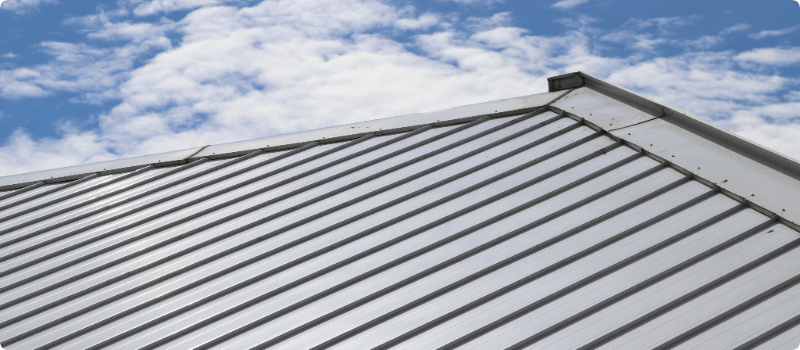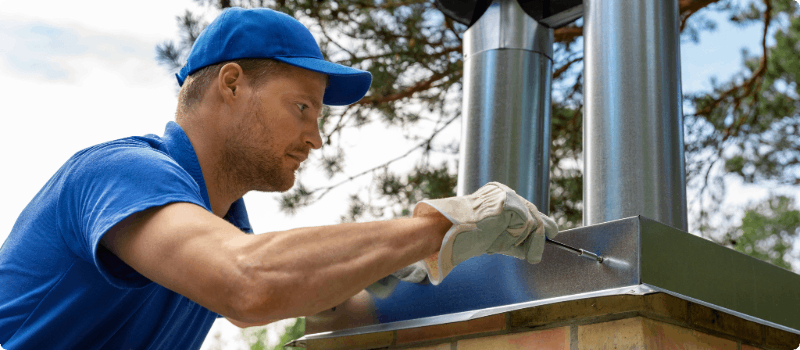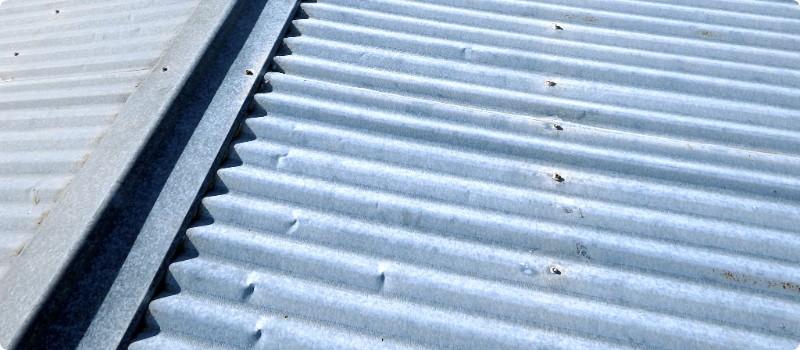Is a metal roof right for you?
Updated May 12, 2022 . AmFam Team
Getting a new roof is a big deal. It’s an expensive purchase, and it has an important job to do. In this article, we'll explore the pros and cons of metal roofing so you can decide if it's right for you. 
What are the types of metal roofs?
Metal roofs are made of copper, steel, aluminum and other metals. Each material has unique characteristics and metal roofs typically come in two different styles: metal panel and metal shingle. One has a distinctive look that is clearly a metal roof and the other looks more traditional. The great news is, because the two styles are so different, you get to choose between a traditional look and a more contemporary style.
Metal panel roofing
This style doesn’t attempt to disguise what it is. Long metal sheets are seamed together vertically for a sleek, modern look. This works best on contemporary homes and keeps the look fresh and linear.
Metal shingle roofing
This style is crafted to look like a traditional roof and comes with Spanish tile, wood shakes or slate options. They often have multi-layer factory finishes that can include granulated stone topcoats giving them a very authentic appearance. From the ground, this look can be indistinguishable from its traditional counterpart and functions the same as the metal panels.

What makes a metal roof a great choice?
From longevity to a clean look, metal roofs have a lot to offer. This new approach to topping your house uses modern materials and techniques to give you a great product. Let’s look at some of the benefits so you can see which ones speak to you.
Longevity
The expected lifespan of a metal roof can be as long as the home’s. Most companies back their product for 20-50 years. And, if you have a paint finish on top of the metal, there’s typically a 30-year limited warranty for the paint. This gives you a long time to enjoy your roof without worrying about repairs or replacement.
Superior protection
A metal roof seals out water, high winds and sheds snow easily. If you live in a snowy climate and are looking to permanently stop ice dams, this could be your solution.
Blocks rain and snow effectively
Metal roofs are excellent at protecting against the damage of rain and snow. Their interlocking panels, paired with a hard and slippery surface, efficiently block moisture from entering your home as rain and snow slide off.
Durable resistance
The slick surface wards off some of the threats traditional roofs face. They’re better at resisting mildew, insects and rot. If you’re concerned about fires, a metal roof can also have a class A fire rating, which is the best rating possible. But if a metal roof is applied over existing wood shingles, then the rating could drop down as low as a C; it depends on what’s underneath.
Quick and easy installation
Metal roofs are easy to install and can be up and ready to go pretty quickly. Sometimes, you can install them right over the existing roof, so you can save some time and expense. Metal roofs are also relatively light, meaning that you can save on engineering and building the support structure of your home.
Environmentally friendly
Metal roofs can be made with as much as 95% recycled materials. Then, when a roof’s life is over, it’s 100% recyclable. This means it starts and ends in an eco-friendly way!
Good at heat conduction
Where metal roofs shine is when it comes to reflecting radiant heat from the sun. Adding specially formulated paint with cool pigments makes it even more effective at reflecting heat. This means you’ll need less energy for air conditioning. If you want to improve its efficiency in colder months, increasing the dead-air space between your roof and roof deck may give you an added layer of insulation.

Why a metal roof might not be right
The pros make a metal roof sound like a wonderful idea, especially when you know you can get one that looks like a traditional roof. But, of course, there are some downfalls, from the initial expense to concerns about matching if you need repairs or build an addition. Let’s look at some areas that might create a little concern.
Dents and dings
Hail is simply not a metal roof’s friend. Aluminum and copper are more susceptible to hail damage, but there are other metals to consider. Some materials have been treated, so they’re guaranteed not to dent. But having that level of durability does have a price attached and it will cost more.
Paint durability
While most painted metal roofs are guaranteed for 30 years, walking on them can cause additional wear. And scratches during installation can shorten the lifespan of the finish. To increase the durability of the paint, make sure the panels are treated with care during installation.
Cost
A metal roof can be expensive, with rough estimates putting metal at about twice the cost of asphalt shingles. It does have longevity on its side, but sometimes, that initial expense just isn’t feasible.
Not accessible
In most cases, you won’t need to be on your roof. But if someone needs to access it, you’ll want to take additional safety precautions. While some metal roofs can hold the weight of a person, many can’t. And, even if your roof is designed to support the weight of a worker, it can be very slippery, especially if wet.
Expansion and contraction
Metal moves with the temperature, expanding in hot weather and contracting when it’s cold. To combat this, the roof should have a fastening system designed to accommodate temperature-induced movement. These fasteners can loosen when temperatures change or over time, so keep an eye out for any movement or waves in your roof line.
Fire
While metal roofs offer great protection from an external source of flame, if the fire starts inside it can create some issues. Firemen often come in through the roof to put a fire out, but with a metal roof this can be much more difficult and take longer.
Noise
Metal roofs can be noisy and if you’re bothered by the drumming of a hailstorm or rain, this could be a negative for you. If you still want a metal roof, installing structural barriers will help minimize the noise and give you the result you want.
Modification concerns
Because the metal comes in big sheets, making small repairs can be a challenge. And if you build onto your home, finding matching material might prove difficult.

What to look for if you decide on a metal roof
If you’ve weighed your options and decided a metal roof is right for you, it’s time to start shopping. We’ve come up with a few important features to help you pick a great product that’ll give you the results you want.
PVDF coating
This coating is very common today and offers the best resistance to streaking and staining for the best in durability and fade resistant finish. It comes in a wide variety of colors and holds the original color and gloss very well.
Self-cleaning valleys
Closed valley systems have hidden waterways to remove water, but they don’t remove all of the debris that ends up on your roof. And leaks can happen if the water path is blocked. Self-cleaning valleys remove those concerns as easily as they do the debris.
Warranties
Pay attention to the warranties and where they come from. You should be offered warranties for the installation, the product itself and the finish. If any one of these areas fails or is defective, having a good warranty on your side saves you a lot of expense.
Certified products
The metal construction association (Opens in a new tab) has a quality certification program that recognizes products made to pre-defined standards in terms of raw materials and process. Products that are certified give you the confidence that they were made with an eye on industry-accepted quality.
Ventilation
Good ventilation keeps your home cooler in the summer and helps prevent ice dams in winter. If you’re reroofing, you should review the ventilation of your home to make sure it’s working as hard as it should.
Special flashings
A flashing is a strip of metal that’s goal is to prevent water from leaking in between your roof and any special features. Some of those features include architectural twists and turns, skylights, chimneys and other construction elements that require extra care. Make sure you understand the flashings that will be used and how these areas will be handled.

Make sure your metal roof is covered
Once you’ve picked out your metal roof and you’re ready to move ahead with the project, give your American Family Insurance agent a call to make sure your homeowners insurance policy is up-to-date, and your roof is covered.
Plus, updating your roof can lead to big savings. If your home’s roof has been replaced within the last five years — or if your home was built in the last five years — your new roof may qualify you for savings on your homeowners insurance with American Family.** Talk to your agent or get a custom online quote.
This article is for informational purposes only and includes information widely available through different sources. This article does not afford, offer, or guarantee any coverage.
*Customers who bundle home and auto insurance policies may save up to 23% on both policies together (as of December 2023). Discounts may vary by state, property, policy form and company underwriting the home and/or auto policy. Discounts may not apply to all coverages on a home or auto policy.
**Homeowners premiums are based on a variety of factors including roof age, roof material and more, which impacts the rate you are quoted and that you will pay.

